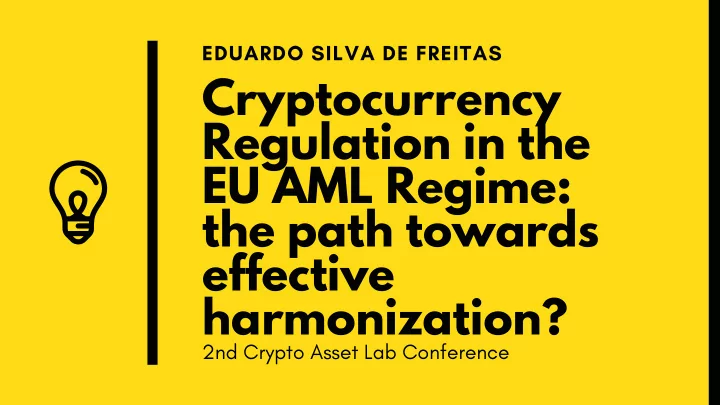

EDUARDO SILVA DE FREITAS Cryptocurrency Regulation in the EU AML Regime: the path towards effective harmonization? 2nd Crypto Asset Lab Conference
CONTEXT AND Financial Accountant , UK, 2019 RESEARCH " EU members adopt tougher crypto rules PROBLEM than AML directive requires" Why is this a problem? WHAT ARE THE SHORTCOMINGS OF Goals of the EU AML regulatory regime (AG AMLD5 IN PROMOTING EFFECTIVE HARMONIZATION OF AML POLICIES Saggio in Case C-290/98 Commission v TARGETING CC TRANSACTIONS Austria ): ACROSS THE EU? Avoid the E[U] from becoming "a field of activity for organised crime"; Promote, "in a manner compatible with [Union] interests [...] an internal market founded on clear-cut and transparent rules". 2nd Crypto Asset Lab Conference
Tokens CRYPTOCURRENCIES Currency tokens Means of payment AN INTERSECTION BETWEEN THE Utility tokens NOTIONS OF "VIRTUAL CURRENCIES WITH BIDIRECTIONAL FLOW" AND Purpose-specific "CURRENCY TOKENS" Investment tokens Fundraising facility in exchange for return on investment VC Schemes Closed In-game money Unilateral Purpose-specific Bilateral Means of payment 2nd Crypto Asset Lab Conference
MONEY LAUNDERING RISKS POSED BY REAL-TIME CRYPTOCURRENCIES TRANSACTIONS ANONIMITY/PSEUDONIMITY Intermediaries are only necessary when Cryptocurrencies are Only information regarding the exchanged for fiat public keys of the persons and currency, so the the amount involved in the traditional AML approach transactions is provided on the focused on the role of blockchain; intermediaries fall short Public keys are easily available, a different one can be used for each transaction 2nd Crypto Asset Lab Conference
Personal scope Financial institutions Bureau of exchange Not in line with the FATF's understanding CRYPTOCURRENCIES UNDER THE EU AML REGIME Material scope AMLD3 Property Assets of every kind, incorporeal and intangible assets 2nd Crypto Asset Lab Conference
Post-Charlie Hebdo era CCs not expressly included in the final text Personal scope Financial institutions Credit institution CRYPTOCURRENCIES UNDER Administering payment THE EU AML REGIME services AMLD4 Material scope Property Assets of every kind, incorporeal and intangible assets 2nd Crypto Asset Lab Conference
"virtual currencies’ means a digital representation of value that is not issued or guaranteed by a central bank or a public authority, is not necessarily attached to a legally established currency and does not CRYPTOCURRENCIES UNDER possess a legal status of currency or THE EU AML REGIME money, but is accepted by natural or AMLD5 legal persons as a means of exchange and which can be transferred, stored and traded electronically" 2nd Crypto Asset Lab Conference
Are out of the scope of AMLD5 Closed VC schemes (Recital 10) Unilateral VC schemes (Recital 11) An extra reason for harmonization expressed: Need to fill the gap of the previous CRYPTOCURRENCIES UNDER directives in tackling the anonimity THE EU AML REGIME feature of CCs AMLD5 The directive did not abandon the "gatekeeper approach" - focus on intermediaries 2nd Crypto Asset Lab Conference
INITIAL TOKEN/COIN OFFERINGS DEFINITION OF VIRTUAL CURRENCIES "Means of exchange" Recital 10 refers to "investment" However, not only the recital should not be interpreted as being more far-reaching than the legislation itself, but also recitals are not binding Assymetrical harmonization: France, Italy and the UK included issuers. Bulgaria did not. 2nd Crypto Asset Lab Conference
INITIAL TOKEN/COIN OFFERINGS DEFINITION OF EXCHANGE SERVICES Only entails fiat-to-crypto trade Thus, ICOs would not be covered since issuers can receive any type of asset as consideration ESMA recommends the explicit inclusion of ICOs under the EU AML regime Assymetrical harmonisation: UK, Italy and Germany included investment in their definition. Bulgaria, for 2nd Crypto Asset Lab Conference example, did not.
CRYPTO-TO-CRYPTO EXCHANGES AND TUMBLERS AMLD5 only entails fiat-to-crypto trade Including "investment" in AMLD5 would not by itself cover ICOs that receive other CCs as consideration Tumbler services also not included Assymetrical harmonization: Italy, France and UK included crypto-to- crypto. Bulgaria did not. 2nd Crypto Asset Lab Conference
JURISDICTION Article 22(2) AMLD3 and Article 33(2) AMLD4 stated that FIUs of host Member States should request information from FIUs of home Member States and not take the initiative themselves; In Case C-212/11 Jyske , ruled in a different direction saying that this would go against the goal of tackling ML; This ruling was overriden by Article 53(2) AMLD4
JURISDICTION Impact on Cryptocurrencies If a host Member State has included a a specific type of entity under their AML regime (e.g. crypto-to-crypto exchanges) but a home Member State did not, the host Member State will not be able to request that the entity operating in its territory submit STRs. And, even if it requests information from the home Member State's FIU, the latter is not obliged to request them from the entity, due to Article 53(2) AMLD4.
JURISDICTION My proposal: extend the possibility of Article 45(9) - appointment of CCPs - to exchange CC-related obliged entities. ENFORCEMENT Decentralized exchanges were not included, so ECB recommends that they be submitted to a number of principles such as transparency, security standards, etc. The use privacy coins is entirely prohibited.
Withdrawal of authorisation MICA Article 20 (issuers) PROPOSAL Article 56 (service providers) Assessment of intended acquisition IMPACTS Article 38 (issuers) Article 75 (service providers) 2nd Crypto Asset Lab Conference
THANK YOU! COMMENTS AND QUESTIONS ARE WELCOME EDUARDO SILVA DE FREITAS PhD Researcher at Erasmus School of Law silvadefreitas@law.eur.nl @Eduardo60696582 eduardo-silva-de-freitas-5aa21619
Recommend
More recommend